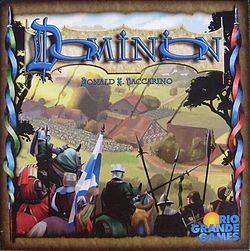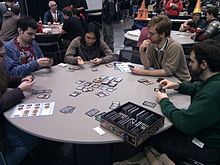- Dominion (card game)
-
Dominion (card game) 
The box cover of DominionDesigner(s) Donald X. Vaccarino Publisher(s)  Rio Grande Games
Rio Grande Games
 Κάισσα
ΚάισσαPlayers 2 to 4 (up to 6 with the Intrigue expansion) Age range 10 and up Setup time 5–10 minutes Playing time ~30 minutes Random chance Low Skill(s) required Resource management Dominion is a designer card game created by Donald X. Vaccarino, and published by Rio Grande Games. The game was released at Spiel 2008 in multiple languages, it's also published by Κάισσα in Greek. It was voted the best game of the fair by the Fairplay polls[1] with a rating of 1.75 from 147 votes. Within two months of its release, Dominion was one of the top ten games according to BoardGameGeek ratings.[2] In 2009, it won the prestigious Spiel des Jahres and Deutscher Spiele Preis awards. It was one of five winning games in American Mensa's 2009 MindGame competition.
Contents
Gameplay
Dominion is a deck-building[3] card game in which the players compete to gather the most valuable deck of cards, representing a Kingdom. There are five main classes of cards:
- Victory cards, which have a Victory Point value that is tallied at the end of the game, but generally have no value during the game.
- Curse cards, which are like Victory cards, but have a negative Victory Point value that counts against the player at the end of the game.
- Treasure cards, played during the Buy Phase, which generate Coins (and sometimes have other effects).
- Action cards generate effects during a player's turn, allowing that player to gain more cards, Coins, Buys, Actions, or get rid of cards, or may affect other players in the game. Some action cards have further subtypes: Attack cards negatively affect other players, and Duration cards affect future turns by the player.
- Reaction cards, which can be triggered out of turn in response to a certain event, such as other players' Attacks.
Some cards share multiple types.
The game is set up with three stacks of Victory cards, one stack of Curse cards, three stacks of Treasure cards; these cards do not change from game to game. In addition, ten stacks of Kingdom cards (most of which are Actions) are added to the tableau. The Kingdom cards can either be selected by the players or chosen randomly. Depending on which Kingdom cards are used, other card stacks may be brought into play. For example, the Alchemy expansion introduces a special Treasure card called a Potion, which is needed to purchase some Kingdom cards from that set; if any such cards are in play, a stack of Potions is added to the initial tableau. Otherwise, they are left out. The size of each Victory card stack and the Curse stack is set by the number of players present, while the size of any other stack is constant. Finally, each player receives the same deck of ten cards, consisting of the lowest value Treasure and Victory cards, and randomly draws five cards to start the game.
Each turn, the player performs the following phases (abbreviated as "ABC" to help new players remember the order):
- Action phase: The player starts with 1 Action during this phase, which with they may play one Action card, following its instructions. As some Action cards generate more Actions, the player may be able to chain many Action cards together in order to generate Coins, Buys, or other benefits. Remaining Actions do not carry over into the next turn.
- Buy phase: The player starts with 1 Buy during this phase, plus any extra Buys generated during the Action phase. To pay for cards, the player can use any Treasure cards in their hand to generate Coins, as well as any Coins earned during the Action phase. The player can buy a number of cards from the tableau up to the number of Buys they have; each card has a price in Coin noted in the bottom left of each card. Bought cards are added to the player's discard pile (from where they will be later shuffled into the player's deck). The player does not need to use all of their Buys nor spend all of their Coins, but unused Buys and Coins do not carry over into the next turn.
- Cleanup phase: The player collects their hand and all played and bought cards and places those into their discard pile. The player then draws five new cards from his deck.
If at any time the player must draw from an empty deck, the player shuffles their existing discard pile and uses it as the deck. Some Action cards can trash cards, removing them from the game permanently. Trashing is one of several[4][5] ways of preventing undesirable cards from being reshuffled into the deck and is currently irreversible[6].
The game is over under two conditions: when the Province stack (the highest-value Victory card in the base game) has been exhausted, or when any three other stacks have been exhausted. At that time, the players count the number of Victory Points in their complete decks, and the player with the highest score is the winner. If playing with Colonies from the Prosperity expansion, the game also ends if the Colony stack (a new Victory card) runs out.
The game has been compared to the "draft" gameplay style of collectible card games where players vie for the best deck from a common pool of cards. The game's main strategy is to strive to have hands that provide 8 coins for which to purchase a Province card; this often results from creating Action card chains, using cards that grant additional actions and benefits to build one's available coins to 8 or more. The game's strategy is also one where the players must balance effective deck building to reach this coin goal with the acquisition of Victory cards to win the game; Victory cards have little value during most of the game, and dilute a player's deck of Treasure and Action cards, clogging up their draws.[7]
History
During development, Dominion was originally called "Castle Builder" and then, later, "Game X".[8][9]
Releases
Color Name Release Date Size Cards Theme Dominion October 2008 Standalone 500 The original game. Kingdom Cards: 25 Adventurer, Bureaucrat, Cellar, Chancellor, Chapel, Council Room, Feast, Festival, Gardens, Laboratory, Library, Market, Militia, Mine, Moat, Moneylender, Remodel, Smithy, Spy, Thief, Throne Room, Village, Witch, Woodcutter, Workshop Intrigue July 2009 Standalone or Expansion 500 Decisions among multiple possible effects. Kingdom Cards: 25 Baron, Bridge, Conspirator, Coppersmith, Courtyard, Duke, Great Hall, Harem, Ironworks, Masquerade, Mining Village, Minion, Nobles, Pawn, Saboteur, Scout, Secret Chamber, Shanty Town, Steward, Swindler, Torturer, Trading Post, Tribute, Upgrade, Wishing Well Seaside October 2009 Expansion 300 Effects that persist to the player's next turn. Kingdom Cards: 26 Ambassador, Bazaar, Caravan, Cutpurse, Embargo, Explorer, Fishing Village, Ghost Ship, Haven, Island, Lighthouse, Lookout, Merchant Ship, Native Village, Navigator, Outpost, Pearl Diver, Pirate Ship, Salvager, Sea Hag, Smugglers, Tactician, Treasure Map, Treasury, Warehouse, Wharf Alchemy May 2010 Small Expansion 150 Introduces the Potion, an alternate card cost. Kingdom Cards: 12 Alchemist, Apothecary, Apprentice, Familiar, Golem, Herbalist, Philosopher's Stone, Possession, Scrying Pool, Transmute, University, Vineyard Prosperity October 2010 Expansion 300 Treasures, victory point tokens, and expensive cards. Kingdom Cards: 25 Bank, Bishop, City, Contraband, Counting House, Expand, Forge, Goons, Grand Market, Hoard, King's Court, Loan, Mint, Monument, Mountebank, Peddler, Quarry, Rabble, Royal Seal, Talisman, Trade Route, Vault, Venture, Watchtower, Worker's Village Cornucopia June 2011 Small Expansion 150 Variety in player decks. Kingdom Cards: 13 Fairgrounds, Farming Village, Fortune Teller, Hamlet, Harvest, Horn of Plenty, Horse Traders, Hunting Party, Jester, Menagerie, Remake, Tournament, Young Witch Hinterlands October 2011 Expansion 300 Cards that have an effect when purchased or otherwise gained. Kingdom Cards: 26 Border Village, Cache, Cartographer, Crossroads, Develop, Duchess, Embassy, Farmland, Fool's Gold, Haggler, Highway, Ill-Gotten Gains, Inn, Jack of All Trades, Mandarin, Margrave, Noble Brigand, Nomad Camp, Oasis, Oracle, Scheme, Silk Road, Spice Merchant, Stables, Trader, Tunnel Promotional Cards
Mini-expansions consisting of a set of a single card type have been released as promotional items.
- Dominion: Black Market (2009)
- Dominion: Envoy (2009)
- Dominion: Stash (2010)
- Dominion: Walled Village (2011)
- Dominion: Governor (2011)
Awards
- 2008 Meeples Choice Awards
- 2009 Spiel des Jahres
- 2009 Deutscher Spiele Preis
- 2009 Mensa Select
- 2009 Golden Geek Award (Game of the Year & Card Game of the Year)
- 2009 Diana Jones Award for Excellence in Gaming
- 2009 Origins Award, best card game of the year
References
- ^ Fairplay online
- ^ BoardGameGeek
- ^ Charis Games Review
- ^ Native Village - http://dominiondeck.com
- ^ Island - http://dominiondeck.com
- ^ Lists of available cards
- ^ Herny, David (2009-02-18). "REVIEW OF Dominion". RPGnet. http://www.rpg.net/reviews/archive/14/14175.phtml. Retrieved 2010-07-26.
- ^ Game Preview/Review: Dominion By W. Eric Martin
- ^ Valerie Putman: Game X = Dominion
External links
- Rio Grande Games' Dominion homepage
- Dominion at BoardGameGeek
- Dominion video review "Dicetower"
- Dominion strategy blog "Dominion Strategy"
- Dominion strategy tips "www.play-board-games.com"
Preceded by
KeltisSpiel des Jahres
2009Succeeded by
DixitPreceded by
AgricolaDeutscher Spiele Preis
2009Succeeded by
FrescoCategories:- Historical board games
- Dedicated deck card games
- Rio Grande Games games
- Spiel des Jahres winners
- Deutscher Spiele Preis winners
Wikimedia Foundation. 2010.

